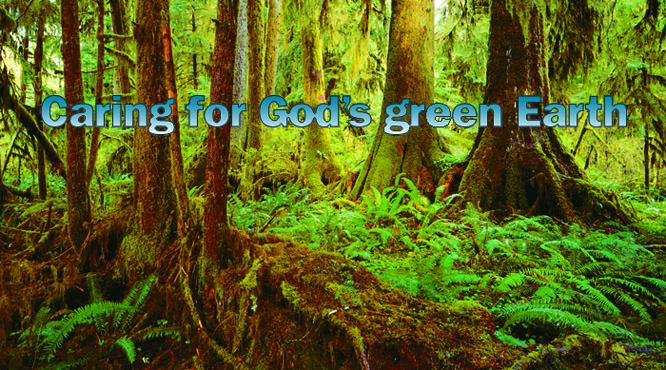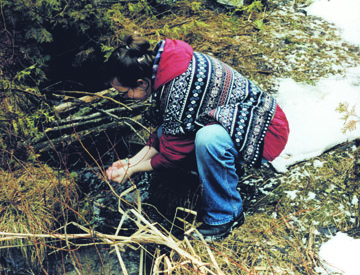Canadian Mennonite
Volume 10, No. 13
June 26, 2006

 |
Two issues ago (May 29), Canadian Mennonite dealt with the how of creation. In this issue, we look at why we need to care for God’s creation as part of our God-given mandate, a mandate that also includes preaching the gospel and making disciples. For those interested in learning more about this important subject, Canadian Mennonite University is hosting “The Good Life on God’s Green Earth” conference this fall; see page 7 for a brief description of the conference topics and speakers.
Why should Christians care for creation?
On what grounds should Christians be committed to care for God’s creation?
Scripture tells us that “the earth is the Lord’s” (Psalm 24:1), and also that “the earth he has given to human beings” (Psalm 115:16). These assertions complement, rather than contradict, each other. The Earth belongs to God by creation, and to us by delegation. This does not mean that God has handed it over to us in such a way as to relinquish God’s own rights over it, but rather that God has given us the responsibility to preserve and develop the Earth on God’s behalf.
How, then, should we relate to the Earth? If we remember its creation by God and its delegation to us, we will avoid two opposite extremes and, instead, develop a third and better relationship to nature.
First, we will avoid the deification of nature. This is the mistake of pantheists, who identify the creator with his creation; of animists, who populate the natural world with spirits; and of the New Age’s Gaia movement, which attributes to nature its own self-contained, self-regulating and self-perpetuating mechanisms. But all such confusions are derogatory to the creator.
The Christian desacralizing of nature—the recognition that it is creation, not creator—was an indispensable prelude to the whole scientific enterprise, and is essential to the development of the Earth’s resources today. We respect nature because God made it; we do not reverence nature as if it were God and inviolable.
Second, we must avoid the opposite extreme, which is the exploitation of nature. Just as we must not treat nature obsequiously as if it were God, we must not behave towards it arrogantly as if we were God. Genesis 1 has been unjustly blamed for environmental irresponsibility. It is true that God commissioned the human race to “have dominion over” the Earth and to “subdue it” (Genesis 1:26-28, NRSV), and these two Hebrew verbs are forceful. It would be absurd, however, to imagine that he who created the Earth then handed it over to us to destroy it. No, the dominion God has given us is a responsible stewardship, not a destructive domination.
The third and correct relationship between human beings and nature is that of co-operation with God. To be sure, we are ourselves a part of creation, just as dependent on the creator as are all his creatures. Yet at the same time God has deliberately humbled himself to make a divine-human partnership necessary. God created the Earth, but then told us to subdue it. God planted the garden, but then put Adam in it “to work it and take care of it” (Genesis 2:15).
This is often called the cultural mandate. For what God has given us is nature, whereas what we do with it is culture. We are not only to conserve the environment, but also to develop its resources for the common good.
It is a noble calling to cooperate with God for the fulfilment of God’s purposes, to transform the created order for the pleasure and profit of all. In this way, our work is to be an expression of our worship, since our care of the creation will reflect our love for the creator.
A final thought: It is possible to overstate this emphasis on human work in the conservation and transformation of the environment. In his excellent exposition of the first three chapters of Genesis, In the Beginning, Henri Blocher argues that the climax of Genesis 1 is not the creation of the human worker, but the institution of the Sabbath for the human worshipper; it is not our toil (subduing the Earth), but the laying aside of our toil on the Sabbath day. For the Sabbath relativizes the importance of work. It protects us from a total absorption in our work, as if it were the be-all and end-all of our existence. It is not.
We human beings find our humanness not only in relation to the Earth, which we are to transform, but in relation to God, whom we are to worship; not only in relation to the creation, but especially in relation to the creator. God intends our work to be an expression of our worship, and our care of the creation to reflect our love for the creator. Only then, whatever we do—in word or deed—shall we be able to do it to the glory of God.
The gospel and nature conservation
 |
For me, as for many other Christians, the authority of Scripture is not in question. So it may be hard for us to come to terms with the realization that we have fallen into deeply unbiblical ways of thinking about people, the world we live in and the gospel itself.
What am I referring to? Care for creation. When it comes to the environment, it seems that we want to force a choice between loving God and caring for what we call society, or even more so, the environment. Of course we want to see all the people we care about be able to accept that Jesus Christ is their Lord more than anything else we might wish for them. But does this mean we can’t care for God’s good creation, too?
Having a limited vision of what constitutes Christian mission is one of our more common evangelical heresies—namely, that we can show we love God only by a very restricted range of activities that we arbitrarily label “spiritual.” (Our lists all differ, but caring for the environment is clearly not included for many.) This view owes a lot to the ancient Greek philosopher Plato and subsequently to the Enlightenment, but little to Scripture. It suggests that only a narrow range of things are “spiritual,” while the rest of what we do in life has little to do with God, and even less to do with our expression of the gospel. That view is simply wrong.
Mission not just about preaching
Behind the false dichotomy between evangelism and caring for creation are some unreliable and unfounded assumptions about the nature of mission. Maybe it needs a modern C.S. Lewis to do justice to the logical flaws that infest them. They are roughly similar to an argument which might run: “You can get to London in a car. So unless you have a car, you can’t get to London.” But just because you don’t have a car doesn’t mean you can’t get to London; you could take a train, ride a bike or walk.
In other words, sometimes the love of God is explained and shown by preaching, but that doesn’t have to be the only way. The explanation of Christ is essential. But, before that, how do you propose to get a hearing, and where will you be heard?
Near Arles, France, less than 2 percent of people now have anything to do with a Christian church. The Église Reformée, where A Rocha France, a Christian nature conservation organization, is involved, gets 20 people on a good Sunday, most of whom are pensioners. More than half those who live in nearby towns are Muslims, and those who aren’t hold few particular organized beliefs. One they do seem to hold very firmly is that life and religion are to be firmly divided—economics, the arts, the environment, money and family have nothing to do with belief, and so can safely be left aside.
This is a challenge, but also an opportunity for those involved in conserving creation at the A Rocha field study centre in the area. The environmental questions that the team are working on include not just the technical “how” and “what” of nature conservation, but the “why” questions too. What we are working on, and the way we work, at their best make clear the character of the creator. Inevitably, discussions follow.
As Pierre Berthoud, A Rocha France’s national chairman, says: “A Rocha is here at the right time. Most French people are ‘spontaneously anti-Christian,’ but at the same time they are increasingly environment-conscious.”
God cares about more than souls
In Romans 12:1, Paul urges us to offer our bodies to God as a spiritual act of worship. But, sadly, we can easily fall into thinking that “spiritual” implies “non-material”—something advocated by Plato. But, by coming to Earth as a human and through the resurrection of Jesus, God has committed himself to the future of creation. If we fail to recognize this, we are in danger of consigning much of our human experience to a place outside of the lordship of Christ.
But nothing is outside the lordship of Christ—including creation. Earlier, in Romans 8, Paul says that the whole creation will share in the glorious freedom of the children of God. Rather than cutting out parts of our experience from the possibility of redemption, the challenge for Christians is to find creative ways of drawing it all in, and to use care for the environment as a way to show God’s love and care for all of creation.
As author and theologian Eugene Peterson has rightly said, “Everything has to do with something else, and if you follow it far enough, it has to do with you and God.”
Christ and creation: A testimony
 |
Paul designates Jesus Christ as “the firstborn of all creation” (Colossians1:15) and before he finishes his sentence twice makes him the subject of the verb “create.” Christ and creation are inseparable, indivisible. Creation is as much a part of the evangelical gospel as Christ is.
So why is it so common among us to separate Christ from creation, creation from Christ? There are plenty of exceptions, of course, but the creation people aren’t conspicuous for showing up in church with the followers of Christ as they pray for their neighbours, learn the Scriptures and nurture their souls. And the Christ people are far outnumbered by the creation people who are out hiking mountain trails and taking in the exuberance of birds in flight.
I was fortunate to grow up in a part of Christ’s creation that had everything, or so it seemed to me: mountains, rivers, glaciers, forests, grizzlies and moose, warblers and hawks. I revelled in all of it. I was also fortunate to be raised in the company of followers of Jesus who knew how to sing and pray, make the Scriptures alive and compelling, and live in bold witness in the world. And I loved it.
But I also ended up with two sets of friends, the creation people and the Christ people. I could never quite figure out why there was so little crossover among them.
When I first learned of A Rocha, a Christian nature conservation organization, I was delighted to find people who were as committed to creation as to Christ, as committed to Christ as to creation. I found myself completely at home in this evangelical company of people who were as at home in the creation of Christ as they are with the Christ who creates. It is a wonderful thing to join hearts and minds and muscles and money with companions in faith who refuse to “put asunder” the Christ and creation that God has joined together.
Bringing healing to the Earth
Winnipeg
Global warming. Species extinction. Water contamination. Oil spills. A brief survey of the news demonstrates how regular and commonplace these environmental issues are in the world. But is this the only word on the environment?
Not for Christians. The Bible shows that Christ came to bring healing and redemption to every corner of the Earth, and that all our relationships are made whole and complete in him. This includes our relationship to creation.
But what does it mean to bring healing and redemption to the Earth? How is our worship of the creator linked with how we treat God’s creation?
These questions, and others, will be addressed at “The Good Life on God’s Good Earth,” a conference at Canadian Mennonite University (CMU) in Winnipeg, Sept. 29 to 30, that will explore biblical resources that can help Christians to apply the transformative power of Christ to the environment.
Keynote speaker at the conference, which is sponsored by CMU, Providence College and A Rocha, a Christian nature conservation organization, is Steven Bouma-Prediger, author of For the Beauty of the Earth: A Christian Vision for Creation Care. Bouma-Prediger will speak on the following topics: “Is God green? The biblical case for Earthkeeping,” and “What then do we do? Living the good life on God’s good Earth.”
Other speakers include August Konkel, president and professor of Old Testament at Providence College and Seminary, and Gordon Zerbe, associate professor of New Testament and academic dean at CMU.
In addition to the speakers, the conference will feature workshops and a field visit to a conservation study centre. For more information, call CMU at 204-487-3300, e-mail creationcare@cmu.ca or visit cmu.ca.